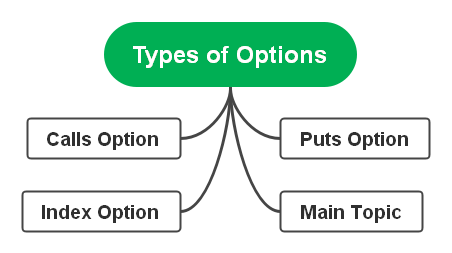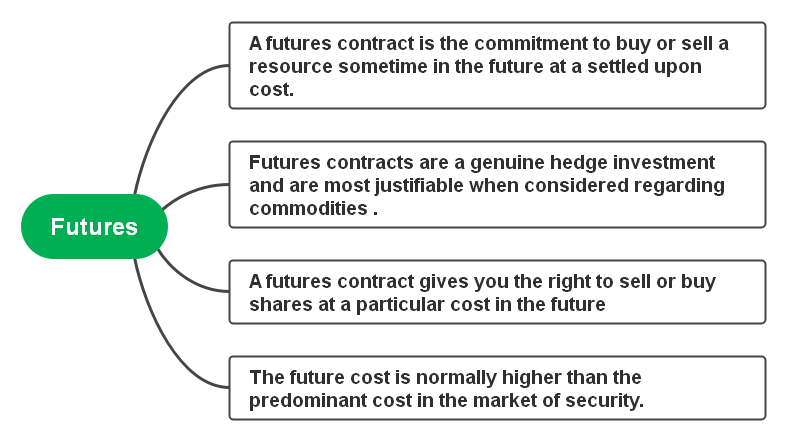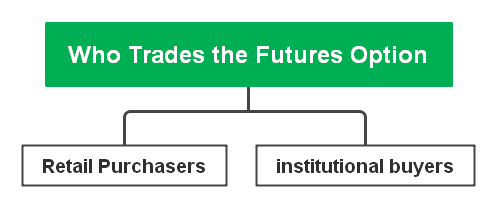Understanding the Futures and Options with Mind Maps
Investors and finance specialists are familiar with the well-known sorts of investment derivatives like mutual funds, bonds, and stocks. However, fundamentally the derivatives compromise of two key items. Options and Futures are the two types of financial investments that give admittance of assets and the tradeoff of the rewards and risks. The difference between future and options is that while futures are linear, options are not direct. Options and Futures exchanging comprises a significant piece of the equity markets. In this article, we will comprehend the difference between Options and Futures and how equity futures and the options market structure a basic piece of the general value market.
Introduction
An options contract gives a financial specialist the right, yet not the commitment, to purchase (or sell) shares at a particular cost whenever, as long as the agreement is as a result. Ironically, a futures contract requires a purchaser to buy shares—and a dealer to sell them—on a particular future date, except if the holder's position is shut before the date of expiration.
Options and futures are both monetary items the investors can use to bring in cash or to fence current speculations. Both the options and future permit a financial specialist to purchase an investment at a particular cost by a specific date. However, the markets for these two items are totally different by the way they work, and that for the investors, they are very risky as well.
A Future is an obligation and the right to purchase or sell a hidden stock (or different resources) at a foreordained cost and deliverable at a predetermined time. Options are a right without a commitment to purchase or sell index or equity. A Call Option is an option to buy, while a Put Option is an option to sell.
What are Options?
Options depend on the estimation of basic security, for example, a stock. An options contract gives the investor a chance, yet not the commitment, to purchase or sell the resource at a particular cost while the agreement is still effective. Investors do not necessarily need to sell or buy the assets or resources if they have made the decision not to go with it.
Options are a subsidiary type of investment. They might be offers to sell or to buy the shares however do not address genuine responsibility for hidden ventures until the understanding is concluded.
Purchasers pay a premium for options contracts, which reflect hundreds of portions of the basic resource. The assets' strike rate is represented on the premium, the rate to purchase or sell it until the expiry date of the contract. This date shows the day by which the agreement should be utilized.

Types of Options
There are two main types of options that are the Put Options and the Call options. A call option is a proposal to purchase a stock at the strike cost before the agreement terminates. A put option is a proposal to sell a stock at a particular cost. The other possibilities include stock options and index options. Here is a detailed discussion:
- Puts Option
Puts give the purchaser the right, however not the commitment, to sell the basic resource at the strike cost determined in the agreement. The seller or the writer of the put option is committed to purchasing the resource if the put purchaser practices their option. Financial specialists or the investor's purchase puts when they accept the cost of the basic resource will diminish and sell puts on the off chance that they trust it will increment.
- Calls Option
Calls give the purchaser the right, however not the commitment, to purchase the fundamental resource at the strike cost determined in the option contract. Speculators purchase calls when they accept the cost of the basic resource will increment and sell calls in the event that they trust it will diminish.
- Stock Option
In case it is the stock option, it tends to be practiced towards the end of any day of the trade or exchange. These are American sorts of options and are indicated as CA (Calls) and PA (Puts).
- Index Option
In case it is an index option, the option must be practiced on the expiry date. These are European kinds of options and are signified as CE (Calls) and PE (Puts).

What is Futures?
A futures contract is the commitment to buy or sell a resource sometime in the future at a settled upon cost. Futures contracts are a genuine hedge investment and are most justifiable when considered regarding commodities like oil or corn. For example, suppose a farmer and he might need to secure a satisfactory cost forthright on the off chance that market costs fall before the yield can be delivered. The purchaser additionally needs to secure a cost forthright, as well, if costs take off when the yield is delivered.
A futures contract gives you the right to sell or buy shares at a particular cost in the future. The future cost is normally higher than the predominant cost in the market of security.

Example:
Suppose there are two traders who agree to a per bushel price of $50 on a future contract of the corns. In case the corn's cost increases and goes up to $55. The buyer of the contract will make $5 per barrel. Whereas, the seller will lose out on a deal.
The market for futures has extended enormously past the corns and oil. Stock futures can be bought on individual stocks or on an index like the S & P 500. The purchaser of a futures contract is not needed to pay everything of the agreement forthright. A level of the cost called an initial margin is paid.
Who trades the Futures Option?
Futures were designed for the buyers who are institutional. These vendors plan to actually claim raw petroleum barrels to offer to purifiers and refiners or huge loads of corn to offer to distributors. Setting up a cost ahead of time makes the organizations on the two sides of the agreement less helpless against the swings of huge prices.
Purchasers that deal in retail, however, sell and buy futures contracts as a wager on the price direction of the basic security. From the changes in the prices of future they want to make a profit., up or down. They do not expect to really claim any items.

What are the Advantages of the Futures and Options?
The options and future of both of the derivatives are common amongst the investors and hedgers, and both of them use it on various securities that are underlying. Both of them enjoy their own perks. Here is a list of the benefits of futures and options.
futures- Trading Certain Investments
Futures may not be the ideal approach to exchange stocks, yet they are an excellent way to exchange ventures that are specifically including indexes, commodities, and currencies. Their normalized highlights and significant degrees of leverage make them especially helpful for the retail investors that are tolerant to risks. The leverage that is high, permits those investors and financial specialists to take an interest in business sectors to which they probably won't have approached something else.
- No Date of Expiry
Various elements impact the expiration time of the options. An options broker needs to focus on time expiry since it can seriously dissolve the productivity of an option position or transform a winning situation into a losing one. Futures, then again, do not need to battle with the expiry of the time.
- Liquidity
This is another significant favorable advantage of futures over options. Most futures markets are profound and fluid, particularly in the most usual commodities to be traded, indexes and currencies. Options, then again, may not generally have adequate liquidity, particularly for options that are well away from the strike cost or terminate all the way into the future.

Options
- Cost-Effective
Great leveraging power comes along with the options. In that capacity, a speculator or investor can acquire an option position, likewise a stock position, however at a cost-saving that can be huge. Clearly, it is not as simple and easy as it looks. The investor needs to pick the correct call to buy to mirror the stock position appropriately. However, this system, known as a stock replacement, is not just suitable yet in addition cost-effective and practical.
- Fewer Chances of Risks
There are circumstances in which purchasing options are more dangerous and risky than claiming equities, yet there are times when options can be utilized to decrease the chances of risk. It truly relies upon how you use them. Options can be safer for speculators since they require less financial accountability than equities, and they can likewise be safer because of their general impenetrability to the possible impacts of openings.
- Conclusion
Having surveyed the essential preferences of options, it is evident why they appear to be the focal point of consideration in today's circle of the finance market. While the upsides of options over futures are very much archived, futures likewise have various focal points over options as well.

Conclusion
Having surveyed the essential preferences of options, it is evident why they appear to be the focal point of consideration in today's circle of the finance market. While the upsides of options over futures are very much archived, futures likewise have various focal points over options as well.
